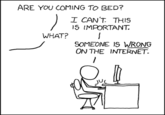About
Danth’s Law (sometimes known as Parker’s Law) is an Internet axiom which asserts that if a person has to insist that he or she has won an Internet argument, it is likely the said person has lost.
Origin
The name stems from a discussion thread posted on the RPG.net forums in October 2005, when one of the members named Danth[2] got into an argument with another poster, Spiderman1fan.[3] As other users began attacking the holes in Danth’s logic, he replied by saying that since people were resorting to mean-spirited comments about him, he took it as a sign that he has won the argument.[4] This observation was coined as “Danth’s Law” two years later with its inclusion in the Rational Wiki[1] in May 2007.
If you have to insist that you've won an Internet argument, you've probably lost badly.
Spread
In 2008, Danth’s Law was invoked at least twice[5][6] on the RPG.net forums, as well as on the Debating Christianity & Religion forums.[23] The next year, a tag for “Danth’s Law”[7] was added to the RPG.net forums to collect other threads referencing the eponym. The law was also referenced in a 2009 Telegraph article[8] on laws of the Internet, a 2010 thread on Democratic Underground[24] and included in the TV Tropes[9] page for Forum and Community Laws.

Cohen's Law
According to RationalWiki[22], a man named Brian Cohen coined a similar eponym in June 2007, which stated that if someone uses the argument “if someone uses the argument that x, they have automatically lost the debate”, then he or she has lost the debate. The recursive statement can be seen as a humorous commentary on the internet users' tendencies to invoke implicit laws as means of supporting their arguments.
The Lenski Affair
In 2008, conservative activist and creator of Conservapedia Andrew Schlafly[10] began corresponding with evolutionary biologist Richard Lenski[11] about his long-term evolution experiment on E. coli bacteria, tracking genetic changes in 12 identical strains. After a paper was published[14] in June 2008 noting that the strains were evolving, with one undergoing at least three distinct changes to enable them to process a new chemical, Schlafly wrote a letter to the biologist arguing that this was not possible, asking for “data supporting [his] remarkable claims.” After Lenski responded with a brief summary of the published paper that would have answered his questions, Schlafly wrote a second letter that seemingly ignored the professor’s initial response, insisting to look at the data himself. Lenski’s second response was lengthy, again urging Schlafly to read the actual paper. Lenski also pointed out that he had reviewed the discussion about the paper on Conservapedia and seen Schlafly refer to his research as fraudulent and a hoax.


Schlafly documented the correspondence on Conservapedia[13], editing Lenski’s letters to his liking. After two users inquired as to why pieces of Lenski’s response was omitted, they were blocked from the Wiki.[15] Additionally, any mention of the letters being edited was removed from the discussion page on the site. Following the incident, Schlafly also added Lenski to Conservapedia’s list of professors who exhibit immoral, unethical or bizarre behavior.[16]
Both the correspondence and Schlafly’s biased editing of the letters to undermine Lenski’s reputation, were covered by a variety of science and politics blogs including A Candid World[17], ScienceBlogs[18], Bad Science[19], Ars Technica[21] and Short Sharp Science[20], the blog of New Scientist Magazine where the original research was published. An unedited version of the correspondence was later posted on Rational Wiki.[15]
Bill O'Reilly
Danth's Law has also been applied to political commentator Bill O'Reilly several times, as he is known for pushing arguments after they seem to have ended.[1] This has been represented in the image macro series You Can't Explain That, taken from an interview between O'Reilly and American Atheists president Dave Silverman when O'Reilly asserted that the tide coming in and out regularly without fail was inexplicable and therefore, proof of a god's existence.
Fox News
By calling themselves "fair and balanced," the cable and satellite television news channel calls its own integrity into question. Much of the criticism about the channel calls this slogan hypocritical, pointing out their right-wing bias. Some of the channel's commentators often cut off their guests or rudely interrupt them if they disagree with the opinions presented.
Search Interest
[not available]
External References
[1] RationalWiki – Danth's Law
[2] RPG.net Forums – Danth's profile
[3] RPG.net Forums – [Spiderman1fan's thread]
[4] RPG.net Forums – explanation of Danth's situation
[5] RPG.net Forums – Re: Speculation on Multiclassing in 4e
[6] RPG.net Forums – Re: Players like it when their characters get SCREWED!
[7] RPG.net Forums – Posts tagged Danth's Law
[8] Telegraph – Internet rules and laws: the top 10, from Godwin to Poe
[9] TV Tropes – The Grand List of Forum and Community Laws
[10] Wikipedia – Andrew Schlafly
[11] Wikipedia – Richard Lenski
[12] Wikipedia – E. coli long term evolution experiment
[13] Conservapedia – Lenski Dialogue
[14] New Scientist – Bacteria make major evolutionary shift in the lab
[15] Rational Wiki – Lenski Affair
[16] Conservapedia – Professor values: Immoral, Unethical, or Bizarre Behavior
[17] A Candid World (via Wayback Machine) – Beneficial Mutations in Bacteria, Wherein Conservapedia is Pwned, Take II: Andy Schlafly’s Lawyer Gambit Fails
[18] ScienceBlogs – Lenski gives Conservapædia a lesson
[19] Bad Science – All time classic creationist pwnage
[20] Short Sharp Science (via Wayback Machine) – Creationist critics get their comeuppance
[21] Ars Technica –
Bacteria evolve; Conservapedia demands recount
[22] Rational Wiki – Cohen's Law
[23] Debating Christianity & Religion – Danth's Law
[24] Democratic Underground – Wow, looks like you've never heard of Danth's Law
Recent Videos
There are no videos currently available.









Top Comments
omnibishop
Jun 14, 2012 at 03:56PM EDT
Tomberry Moderator
Jun 15, 2012 at 08:56AM EDT